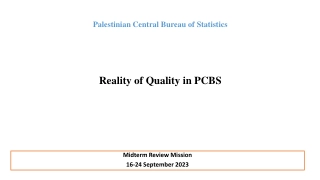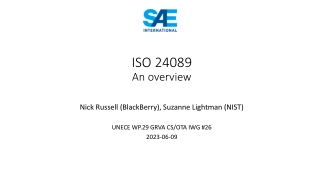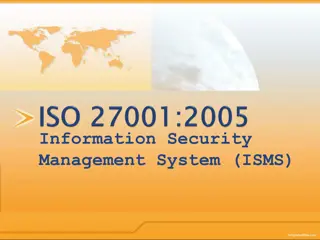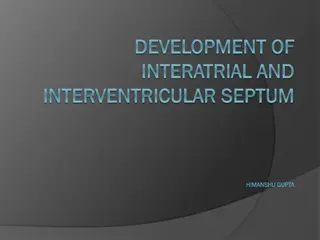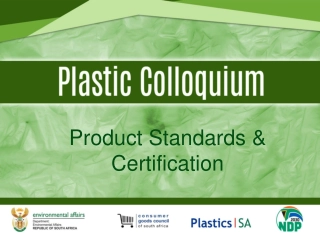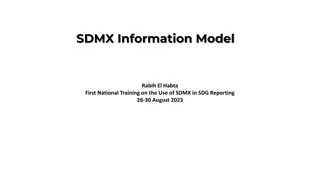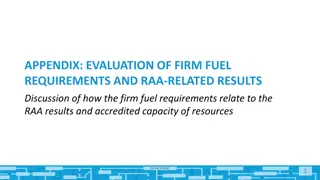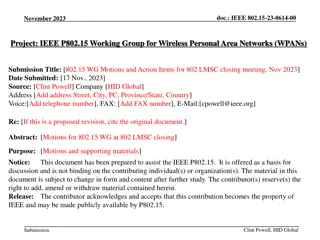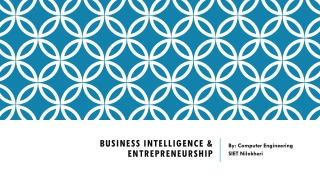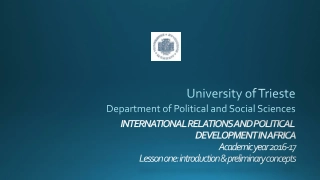formation iso 9001
Lu2019IAS propose un coursdu2019auditeur principal ISO 9001 avec des spu00e9cialistesexpu00e9rimentu00e9s qui sont des auditeursen temps ru00e9el pour aider les du00e9lu00e9guu00e9s u00e0 amu00e9liorerleursconnaissances et leurscapacitu00e9sactuelles. Ce cours de formation ISO 9001 fournit les informations et les compu00e9tencesrequises pour que les individusentreprennent un audit approfondi du2019un systu00e8me de gestion de la qualitu00e9.
Download Presentation
Please find below an Image/Link to download the presentation.
The content on the website is provided AS IS for your information and personal use only. It may not be sold, licensed, or shared on other websites without obtaining consent from the author. Download presentation by click this link. If you encounter any issues during the download, it is possible that the publisher has removed the file from their server.
Presentation Transcript
Introduction ISO 9001 is an internationally recognized standard for quality management systems (QMS) established by the International Organization for Standardization (ISO). It provides a framework for organizations to implement effective quality management practices, enhance customer satisfaction, and continually improve their processes. Achieving ISO 9001 certification demonstrates an organization's commitment to delivering high- quality products and services while meeting regulatory requirements and customer expectations. This article explores the importance of ISO 9001 training and formation, key components of the training process, its benefits, and challenges organizations may encounter. Importance of ISO 9001 Formation ISO 9001 formation is crucial for organizations aiming to implement and maintain a quality management system aligned with international standards. Training employees on ISO 9001 principles, requirements, and best practices ensures that they understand their roles and responsibilities in achieving quality obeectives. oormation also fosters a culture of quality within the organization, encouraging continuous improvement and employee engagement. By investing in ISO 9001 formation, organizations can enhance their competitiveness, customer satisfaction, and operational efficiency. Key Components of ISO 9001 Formation 1.Understanding ISO 9001: The formation process begins with an overview of the ISO 9001 standard, its purpose, and its key principles. Participants learn about the structure of the standard, including its clauses and requirements, and how it applies to organization. Understanding ISO 9001 lays the foundation for effective implementation and compliance. their 2.Implementation Planning: oormation helps organizations develop a comprehensive implementation plan tailored to their specific needs and obeectives. Participants learn how to conduct a gap analysis to identify areas for improvement, establish quality obeectives and targets, and allocate resources effectively. Implementation planning ensures a systematic approach to integrating ISO 9001 requirements into existing processes and practices. 3.Documentation and Training: ISO 9001 formation emphasizes the importance of documentation and training in maintaining an effective QMS. Participants learn how to develop and maintain quality manuals, procedures, work instructions, and records required by the standard. Training programs ensure that employees understand the QMS requirements, their roles in its implementation, and how to perform their tasks effectively. 4.Internal Auditing and Continuous Improvement: oormation includes training on internal auditing techniques to assess the effectiveness of the QMS and identify areas for improvement. Participants learn how to plan, conduct, and report on internal audits, as well as how to implement corrective and preventive actions.
Continuous improvement is a core principle of ISO 9001, and formation instills a culture of ongoing review and enhancement within the organization. Benefits of ISO 9001 Formation ISO 9001 formation offers numerous benefits to organizations, including: 1.Improved Compliance: oormation ensures that employees understand ISO 9001 requirements and how to comply with them, conformities and regulatory issues. reducing the risk of non- 2.Enhanced Quality: Training employees on quality management principles and best practices helps improve product and service quality, leading to higher customer satisfaction and loyalty. 3.Increased Efficiency: oormation streamlines processes, reduces waste, and optimizes resource utilization, resulting in improved operational efficiency and cost savings. 4.Greater and continuous improvement, empowering employees to take ownership of their roles and contribute to organizational success. Employee Engagement: oormation fosters a culture of quality Challenges of ISO 9001 Formation While ISO 9001 formation offers many benefits, organizations may encounter challenges in its implementation: 1.Resource Constraints: Limited resources, including time, budget, and personnel, can hinderthe effectiveness of formation efforts and delay implementation. 2.Resistance to Change: Employees may resist changes to existing processes and practices, particularly if they perceive formation as burdensome or disruptive. 3.Complexity requirements can be challenging, especially for organizations new to quality management systems. of the Standard: Understanding and interpreting ISO 9001 4.Sustainability: Sustaining momentum and engagement after formation can be difficult, requiring ongoing leadership continuous improvement. support and commitment to Conclusion formation iso 9001 is essential for organizations seeking to implement and maintain effective quality management systems aligned with international standards. By training employees on ISO 9001 principles, requirements, and best practices, organizations can improve compliance, operational efficiency. While formation offers numerous benefits, organizations must address challenges such as resource constraints, resistance and the complexity of the standard Investing in ISO 9001 formation demonstrates a commitment to quality and continuous improvement, positioning organizations for long-term success in today's competitive marketplace. enhance quality, and increase to change, to ensure successful implementation.








